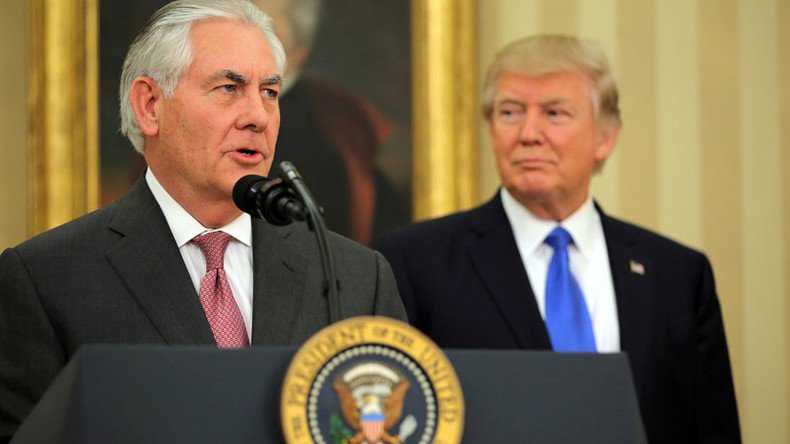Trump wading into Mideast quagmire over Turkey and Kurds in Syria

US Secretary of State Rex Tillerson gave notice this week that the Trump administration was stepping up its military involvement in Syria and Iraq. But the military road map he laid out is in danger of leading the US even deeper into problems.
Most problematic perhaps is the fact that US forces are deepening their alliance with Kurdish militants in northern Syria. That has grave implications for a rupture with Washington’s key NATO ally Turkey, as well as the danger of an eventual confrontation with Syrian government forces.
Tillerson, the top US foreign policy official, was addressing leaders of the 68-nation American-led coalition gathered in Washington on plans to defeat Islamic State (IS or ISIS) terrorism.
Recall that President Trump had made signature promises during his election campaign that he would “knock the hell out of ISIS” – as well as “drain the swamp” of government inefficiency in Washington DC.
Keeping to his word about coming up with a master plan to defeat terrorism, the Trump administration this week announced a much more vigorous military intervention in Syria and Iraq than was seen under President Barack Obama.
Secretary Tillerson outlines progress, successes in fight against ISIS. pic.twitter.com/dzHBWeg3nk
— Department of State (@StateDept) March 22, 2017
The irony, however, is that while Obama spent eight years trying to get the US out of a quagmire in the Middle East created by his predecessor, GW Bush, now President Trump seems to be heading right back into the morass. Even more ironically is that Trump had used his inauguration speech on January 20 to say that his administration was done with “nation building” and costly military interventions overseas.
At least from what Tillerson announced this week during the coalition summit, it would appear that US military forces are preparing to occupy areas of Syria and Iraq for the long term. Said Tillerson: “The military power of the coalition will remain where this fraudulent caliphate has existed in order to set the conditions for a full recovery from the tyranny of ISIS.”
There seems little ambiguity about what that entails. US troops are being committed to, if not nation building, then “region building” within countries.
Secretary of State Tillerson added: “Local leaders and local governments will take on the process of restoring their communities in the wake of ISIS with our support. The development of a rejuvenated civil society in these places will lead to a disenfranchisement of ISIS and the emergence of stability and peace where there was once chaos and suffering. But none of this will happen automatically. We all need to support this effort.”
Granted, it could all be just grandiose hot air from Washington, which will blow away as soon the military going gets tough.
Nevertheless, the Trump administration appears to be indeed wading deeply into the Middle East.
The clearest sign was the major airlift this week by US forces of Kurdish insurgents to Raqqa, the strategic ISIS stronghold in Syria. Up to 1,000 US marines were reportedly involved in the operation. The development evidently goes beyond Pentagon claims that its troops are acting merely as “military advisers” to Kurdish fighters. American forces are digging in as part of the anticipated offensive to take Raqqa.
And if the plans laid out by Tillerson are held to, then the US troops will remain in the area to help the Kurds build governance. The same goes for other areas in northern Syria and Iraq where American forces are deployed to “liberate from ISIS”.
Turkey is claiming that US military supplies to Kurdish militias have been boosted. It appears that Washington has decided to throw its weight behind the Kurds as the most effective fighting force against the Islamists. Previous attempts by the US to organize Sunni Arab formations have reportedly proven lackluster, to say the least.
However, in backing the Kurds, the Trump administration is risking a rupture with NATO ally Turkey. Ankara has repeatedly warned of a “collision course” if Washington persists in working with the Kurds. The Kurdish People’s Protection Units (YPG) are viewed by the Ankara government as “terrorists” affiliated with the outlawed Kurdistan Workers Party (PKK) based inside Turkey.
Turkish President Recep Tayyip Erdogan and his ruling Justice and Development Party fear that the Syrian Kurds will form an autonomous state in northern Syria, which in turn will serve to bolster the separatist Kurds across the border in Turkey.
When Turkey launched its incursion – dubbed Euphrates Shield – into northern Syria last August, the main reason cited by Ankara was to contain Kurdish militants and prevent them gaining a foothold around the Euphrates River.
Now it appears to Ankara that the US is sacrificing its longtime alliance by taking up arms with the Kurds – a sworn enemy of Turkey.
Reuters quotes one senior Turkish official fuming with exasperation, saying: “It appears that the US may carry out this operation with the YPG, not with Turkey. And at the same time the US is giving weapons to the YPG. If this operation is carried out in this manner there will be a cost for Turkey-US relations, because the YPG is a terrorist organization.”
In a separate report, another senior Turkish security official said Ankara had given Washington an ultimatum on the issue: “Our soldiers will not be fighting together with people who shot us and killed our soldiers and are trying to kill us… This message was delivered to the Americans.”
Turkey is demanding that the US backs Arab militias belonging to the so-called Free Syrian Army. But past experience has shown these units to be unreliable. Besides, the die seems to have already been cast, with Washington moving decisively to align with the Kurds.
US airlifts Syrian fighters in bid to surround #ISIS in #Raqqahttps://t.co/VFtKVVusnxpic.twitter.com/KCcKs1MGSa
— RT America (@RT_America) March 22, 2017
If the Trump administration holds to its plan, as outlined this week by Rex Tillerson, of deploying US troops to consolidate self-governing areas, then the American presence with the Kurds will inevitably be for the long haul. That is going to intensify strains between Ankara and Washington. Just when Erdogan was hoping that the new Trump administration might be more amenable than the Obama one, which he fell afoul with over Syrian policy and the attempted coup in Turkey last July.
But a potential quagmire for Trump does not stop there. Syrian President Bashar al Assad recently warned that any US troops present in his country would be viewed as “aggressors”.
If American troops were to set up long-term missions to help the Kurds around Raqqa and northern Syria, it seems only a matter of time before the Syrian national army will be compelled to challenge the presence of US forces in the country. Assad and his Russian and Iranian allies have repeatedly said that Syrian sovereignty and territorial integrity are inviolable.
Thus if Trump tries to make a gung-ho success of policy in the Middle East – and let’s face he needs to show some achievement given his domestic woes – his administration is liable to encounter multiple snafus. From the Turks, Kurds and Syrians, not to mention serious implications with regard to Russia, Iran and Hezbollah.
Trump is already having wearisome trouble draining the swamp in Washington. The last thing he needs is to wade further into a Middle East quagmire.
The statements, views and opinions expressed in this column are solely those of the author and do not necessarily represent those of RT.













